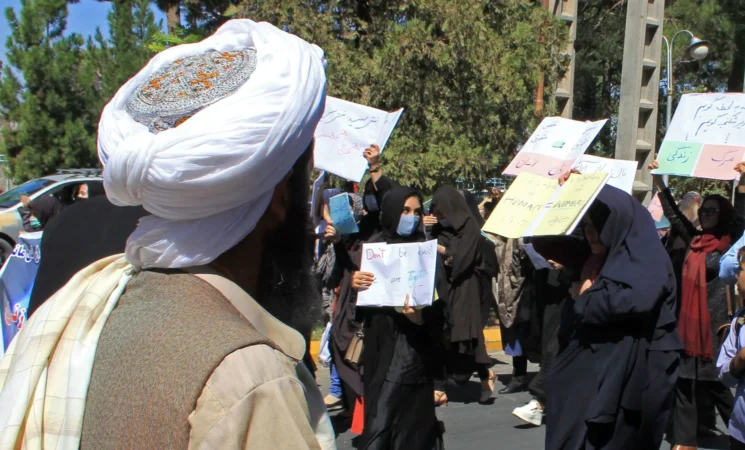26 August 2022, NIICE Commentary 8220
Julia Jose
The US withdrawal from Afghanistan after its 20 years of military presence has created havoc all across the globe. After US withdrawal from Afghan soil, the Taliban toppled the government and took control. This is the first time they are coming to power and subjecting violence after peace talks with the US government. Social, economic and political impacts were very much visible but the impacts that went unnoticed were the impact on women of Afghanistan. The Taliban coming to power was not less than nightmare for women as their rise denied women from availing existing opportunities and made the women of Afghanistan see their future in bleak with no opportunities coming their way. Afghan’ women’s day to day functioning were intruded upon, like they were not allowed to work outside, were imposed ban on girl’s education after six years of age, denied women right to political participation.
Afghanistan’s supreme leader has told women to cover their faces in public and to wear Chadori (head to toe covering burqa). Western observers and Afghan civil society highlighted the absence of women in governing structures like in political offices and negotiating tables. Women of Afghanistan tried to raise the issue of their absence in political structures with the Taliban but they remained unresponsive and rigid in their approach. Even the women who were appointed to the decision-making table confirmed the Taliban’s abuses and they also opposed the Taliban’s return to power.
Women Under Draconian Rule
Draconian restriction on freedom of movement talks about their last rule in the 1990s. 1990 was the time Taliban came in with a lot of restrictions on women like mandatory burqa coverings, restricting their access to health care, preventing them from appearing in public or not allowing them to explore public domain/arena. Women to be with male chaperones was another rule imposed on women and the Taliban were having all male cabinet and absence of Ministry of Women Affairs. Other than cultivating opium, women were not even allowed to explore medical field or any other field. According to reports, 2003 was the period when less than 10 percent of girls were enrolled in primary schools but it had grown to 33 percent by 2017, female enrollment in secondary education had grown from 6 percent to 39 percent by 2017. Gains happened but unequally. The Taliban believe women should stay at home, they should not step outside if they are stepping outside it should be with close male relatives as a result of this several solo women travellers were stopped mid-way from boarding flights.
Significance of Women in Every Aspects
Soaring food and fuel prices due to a number of reasons like drought and the Ukraine war meant women headed households not getting enough to eat. It has been a year since disrespect for their right to live freely, denying them opportunity to livelihood and access to healthcare and education, said Sima Bahous, Executive Director of UN Women. Kanem was of opinion that keeping women out of secondary education not only prevents them from realizing their true potential but puts them in increased risk of child marriage, early pregnancy and violence. Breakdown of health care impacted women’s reproductive health services and maternal health care. Bohous explains how excluding women from all aspects of life robs populations half of its energy and talent. Another important point to be noted is without participation of women in society, peace and stability would remain a distant dream and difficult to accomplish. Baring girls from attending secondary education, a country loses its 2.5 percent of GDP.
Undisputed Violence
When the Taliban took over, they emptied all the prisons and filled it with women. Another thing which went unnoticed was missing women cases going unrecorded. In Afghani society, forced marriages were common but when the Taliban came to power forced abduction became a common practice. Suicidal rates among women multiplied which is also not recorded. Amnesty International’s Secretary is of the opinion that a suffocating crackdown against women is on rise since the Taliban came on power. When women and girls in Afghanistan are responding to this crackdown they are being tortured physically and mentally and subjected to arrest and detention. Detained protestors have no access to even basic necessities like water, food, sanitary products and health care. Women have to pay costs to secure their release, and are told to sign agreements that their family members will never protest again or speak anything about their experience in detention. Women are not provided health care services without mahram. In January 2022, group of 36 UN human right experts shared that systematic gender-based discrimination and violence against women and girls is on rise in Afghanistan.
Way Forward
Amnesty international is calling the Taliban for major policy changes, to upheld the rights of women and girls. Government and International Organization including UN member states and UN Security Council must develop or come up with coordinated strategy to bring about changes. It’s high time for UN Security Council or the member states to act upon for the violence against Afghan women. UN Security Council should come up with travel bans or sanctions to prevent the Taliban from torture inflicted upon women.
Julia Jose is a Student at Central University of Gujarat, India.

